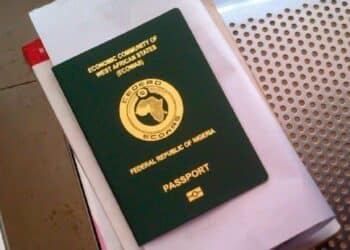Hundreds of Nigerian students and other Nigerian citizens are stuck in Ukraine amid the Russian invasion of that country and the closure of Ukrainian airspace.
Some worried parents of the students on Friday appealed to the Federal Government to expedite action on the evacuation, back home, of their children and other Nigerians who have escaped to Poland and rescue others who are still trapped in the beleaguered country.
Two of the concerned parents, one based in Ibadan, Oyo State, and the other, Osogbo, Osun State, spoke to Saturday Tribune on Friday.
One of the parents said: “My kids, three of them – two girls and a boy – were caught in the Russian invasion of Ukraine. The girls have escaped by taking an eight-hour trip by road to Poland. My boy is still on the way to join his sisters in Poland.”
Saturday Tribune learnt that Polish immigration authorities allow fleeing people of all nationalities into their country once they hold documents such as certificate of insurance, student identity card and international passport.
An estimated 4,000 Nigerians are studying in tertiary institutions across Ukraine, according to data from the government – the highest number of African nationals there, along with Morocco.
No evacuation for now – Ukrainian ambassador
However, the Ukrainian Ambassador to Nigeria, Kirdoda Valerii, on Friday said efforts to evacuate Nigerian students and citizens presently in his country remained impossible for now because the Ukrainian airspace was currently shut. Valirii stated this after a meeting with the Minister of Foreign Affairs, Geoffrey Onyeama, in Abuja.
Speaking on reports of Nigerians being drafted into the country’s armed forces in exchange for citizenship, the envoy, who spoke through an interpreter, said it is an open option.
Also speaking, Onyeama, re-emphasising the Federal Government’s calls for peace, gave the assurance that the government would do everything possible for the safety of its citizens anywhere in the world.
“Everyone is under pressure — there have been explosions in different cities, including my city, Kyiv,” 23-year-old Nigerian student Sarah Ajifa Idachaba, who is studying medicine in the Ukrainian capital along with her older sister, told DW.
“Me and my sister are in a panic because we don’t know what to expect. We are not safe and we are not sure about leaving here because the airport is shut down,” Idachaba said after Russia launched an invasion of Ukraine early on Thursday morning.
Idachaba said she and her sister felt abandoned as air raid sirens were heard across Kyiv and some residents sought refuge in metro stations and air-raid shelters.
“We are citizens of Nigeria, and we need help. Please don’t neglect us, don’t leave us alone,” she said.
Nigerian Temi Rosabel Tseye Okotie, who is also studying medicine in Ukraine, shares Idachaba’s feelings.
“Honestly? We are scared — we don’t know what to do. The information we are getting from Nigeria is basically that we are on our own,” she told DW.
Shaken by bomb blasts
Al Jazeera, in a report on Friday, painted a picture of what has become a lot of some of the Nigerian students trapped in Ukraine.
Shortly after Russian President Vladimir Putin’s half-hour speech declaring war on Ukraine, Annora Omolu, a Nigerian undergraduate at Kyiv Medical University heard a small blast by the window of her apartment.
The blast startled the 20-year-old who started simultaneously shaking and praying.
In the days before Putin’s speech, she had been calm because everything in Kyiv had seemed normal. But as she remained glued to the television, her calmness quickly gave way to crippling fear.
“I don’t even know right now [how I feel] because I cannot think. I’m literally shaking,” she told Al Jazeera.
At daybreak, she tried to book a flight to Lviv in western Ukraine, some 469 kilometres from the capital, to join other Nigerians there and cross to Poland. But the Ukrainian government had shut down its airspace.
Confused and scared, she began to reach out to the Nigerian embassy in Ukraine for assistance. “Can they send us flights?” she asked.
‘Everybody is absolutely on their own’
Ahead of Russia’s invasion on Thursday, more than a dozen European and Asian countries were urging their citizens to leave Ukraine.
The United States, Canada, Germany, Australia and other countries have evacuated members of their diplomatic staff and their families.
But even after the invasion, no African country has announced concrete plans for the evacuation of its citizens.
Morocco and Egypt which also have a high number of citizens studying in Ukraine, have only urged them to ensure their personal safety.
“Many of the African governments do not simply have a sense of responsibility to their citizens,” Ibrahim Anoba, a fellow at US-based Center for African Prosperity at the Atlas Network, told Al Jazeera.
Nigerian student unions in Ukraine said they made several calls to the Nigerian embassy in Kyiv without getting a response.
“There has been no embassy response. All they say is check the website and the last update on the website is January 26. Everybody is absolutely on their own,” Anjola Ero-Phillips, president of the Nigerian Students Union in Lviv, told Al Jazeera.
Al Jazeera called one of the embassy representatives who said it had to get Abuja’s approval to be able to initiate any form of evacuations.
A statement released by the embassy on Thursday simply urged Nigerian nationals to “remain calm but be very vigilant and be responsible for their personal security and safety.”
The statement added: “Should any of Nigerian nationals consider (sic) the situation as emotionally disturbing, such nationals may wish to temporary relocate to anywhere consider (sic) safe by private arrangements.”
The House of Representatives tweeted that it would “shoulder the immediate evacuation of Nigerian students from Ukraine” and that the chair of its foreign affairs committee would fly into Ukraine on Friday but did not outline the details of its plan.
Over the last two decades, Ukraine has emerged as a choice destination for African students, especially those in medicine-related fields, because it is cheaper compared with elsewhere in Europe, and the United States. Even during the Cold War era, students of African descent were given scholarships to study in different states across the Soviet Union as the communist enclave sought to increase its soft power in Africa.
No ‘definitive position’
Foreign affairs minister, Onyeama, told the Nigerian Television Authority (NTA) that willing and ready students would be evacuated as soon as the airports open. “The advice we were getting was that we should not panic, the embassy was in touch with the students telling them to take reasonable precautions,” he said.
According to Onyeama, the government was undecided given Russia’s position about not initially invading Ukraine and intelligence reports from the US and the UK that an invasion was imminent.
“It was very difficult to take a definitive position with regard to advising everybody to leave,” he said.
Aanu Adeoye, a London-based Mo Ibrahim Foundation Academy Fellow at Chatham House, who researches Africa-Russia relations, told Al Jazeera that a number of supposedly “first-world” countries also lacked mass evacuation plans for their citizens.
But “I think where Nigeria has not covered itself in glory is that their communication has been muddled,” he said.
Adeoye added: “They basically have not had a unified message to Nigerians. Even something as basic as having a functional website, that just shows a lack of strategy.”
In Ukraine, Nigerian students remain unsure of whatever comes next. They have continued to express grievances with the embassy, accusing the authorities of neglecting their concerns even though they say they already have low expectations.
“From experience, I don’t think we can count on [the] Nigerian government to do anything,” Owolabi Gbolahan, former president of the Nigerian Students’ Union in Ivano-Frankivsk told Al Jazeera.
His tenure coincided with the peak of the coronavirus pandemic when he accused the government of neglecting Nigerian students as other countries were evacuating their citizens from Ukraine.
Meanwhile, Omolu is desperate to return to Nigeria or even get to Lyiv first but remains trapped in Kyiv where she cannot even move about.
“I am just tensed (but) thinking of a plan to leave,” she said.









